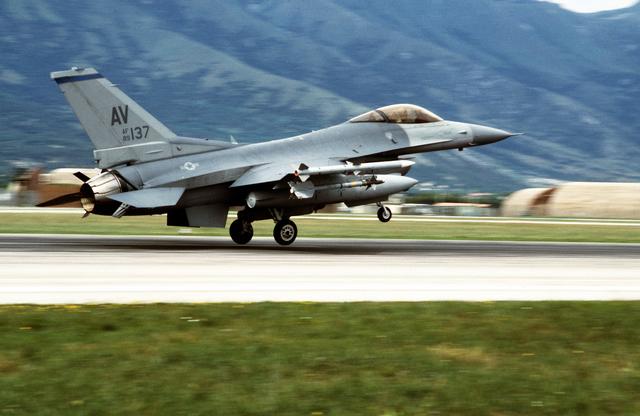MARCH 17, 2022
NATO is Not a Defensive Alliance

NATO planes engaging in aerial bombardments during Operation Deliberate Force. Photograph Source: US Army – dodmedia.osd.mil – Public Domain
Reading US reports on the deadly Russian rocket attack on the so-called International Peacekeeping and Security Center in western Ukraine, one could be excused for thinking that the Russians might have been destroying some UN peacekeeping base.
In fact, the deceptively named target, as a few US news reports on the attack did note, is actually a joint NATO/Ukrainian military base near the border of NATO member Poland that has specifically long been where US and NATO military trainers have worked with Ukrainian troops, teaching them the finer points of handling the lethal equipment being supplied to them by the US and some NATO nations like France, Germany, Britain, and Turkey. (400 Florida National Guard troops were doing just that before being hustled back to Florida as Russia began threatening an invasion into Ukraine a few weeks ago.)
A day before the rocket attack, and just after the Biden administration announced the approval of another tranche of $200 million worth of weapons for Ukraine, Russia warned that any arms shipments coming into Ukraine would (of course!) be considered fair targets for attack. This warning was typically described by the jingoistic corporate-owned media in the US as increasing the risk of a wider war, though the actual supplying of more lethal weapons to Ukraine by the US and its NATO allies was not so labeled.
NATO meanwhile is typically described as a defensive treaty organization of countries that have a mutual assistance pact to come to each other’s aid with military force if any member is attacked.
But NATO is hardly a “defensive organization.”
Indeed, from its founding NATO has been an aggressive alliance designed to hem in the then Soviet Union, and to to threaten it with destruction by US nuclear weapons which were and still are stored in member countries, sometimes actually mounted on missiles and available for rapid loading onto US and NATO bombers parked on air bases all over Europe. That hemming-in process today, following decades of further expansion of NATO following the Soviet Union’s collapse, includes adding members located right up on the Russian border in countries like Poland, Estonia and Latvia (where US rockets and nuclear-capable planes are minutes away from critical Russian targets like army and air bases, as well as major navy ports.
NATO was founded in early April 1949 when the Soviet Union didn’t even have a single nuclear weapon and was not expected by US scientists and security people to get one for another 5-10 years. Yet the organization was also founded at a time that the US, which was working round the clock to industrialize production of its new, initially hand-made atomic bombs, had already assembled and stockpiled over 200 of these city-destroying weapons. That is a pretty awesome arsenal for a country that at that time had no rival in destructive capability.
Add to that reality the fact that the US was also already well on the way to producing a vastly more powerful hydrogen bomb (a project that Los Alamos scientists began almost immediately working on right after the August 1945 surrender of Japan). Significantly, in the late 1940s the Pentagon, on President Truman’s orders, had re-activated the assembly-line for producing B-29 bombers — the only plane at the time able to deliver its atomic weapons — while also developing more powerful heavy bombers like the B-36 and B-52. Why the rush? Because there were plans to launch a preemptive nuclear blitz on the Soviet Union. These plans, updated as the US arsenal of atom bombs expanded towards the 300-400 number that Pentagon strategists advised Truman would be needed to destroy the USSR as an industrial society. The succession of operational plans for that attack had such cringe-inducing names as Operation Sizzler, Scorch, Broiler, and Dropshot. (The only reason such a genocidal first-strike on the Soviet Union never happened in the early ’50s when the US stockpile finally reached that attack goal of over 300 bombs, was that on Aug. 29, 1949, the USSR successfully exploded its first atom bomb, shocking the US war department and leading to cancellation of any Washington plans for an early attack.)
Three years later, on Nov. 1, 1952, the US successfully exploded its first thermonuclear bomb, a weapon a thousand times more powerful than the atom bomb dropped on Nagasaki.
NATO’s creation has to be viewed in the historical context of America’s astonishing power at that time. Knowing it had the only atom bombs in the world, making it unopposable, the treaty with western European nations was clearly set up to allow the US to keep troops in Europe indefinitely and more important, to stockpile and prepare to launch nuclear weapons against the Soviet Union from locations a short distance from the Soviet capital and industrial heartland.
Any American political figure who claims NATO is or ever was a “defensive” alliance and: “not an offensive threat” to Russia is either ignorant or a liar. And calling the military base that was just hit with Russian missiles, killing 34 and injuring another 135 people, a “peacekeeping” center is as laughable as naming the incredibly deadly MX missile with its ten 300-kiloton independently targetable nuclear warheads, the “Peacekeeper,” as that professional huckster President Reagan did.
Nenhum comentário:
Postar um comentário